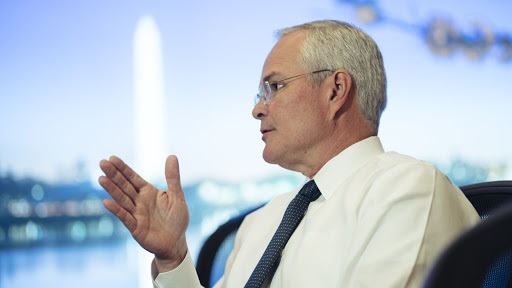S&P Dow Jones Indices late on Monday, August 24, 2020 cleaned out two of the oldest constituents of the Dow Jones Industrial Average, saying it would replace ExxonMobil and Raytheon Technologies in its historic barometer of American blue-chips.

The oil major and industrial conglomerate were two of three companies booted from the 30-strong index, along with drugmaker Pfizer, to allow for a reshuffle prompted by Apple’s decision to split its stock.
The oil major’s exit after nearly a century at S&P Dow Jones has however been attracting comments from environmental activists, who describe that development as “a historic marker of the end of the fossil fuel era”.
In a reaction on Tuesday, May Boeve, 350.org Executive Director, said: “Big Oil has fallen. Our job is to make sure they do not take us down with them. Fossil fuel companies like Exxon knew and lied for decades about the main cause of the devastating impacts we are now experiencing across the globe: from fires, storms and floods to droughts and rising seas. As the finance world wakes up and cuts ties with these climate criminals, we are rising up to make polluters pay for their destruction.
“Exxon’s deep fall today is another powerful reminder of how fossil fuels are too volatile to be the basis of a resilient economy. It is past time for Exxon to recognise that it is not only one of the most responsible for the climate crisis, but also that its assets are quickly becoming stranded as we move towards more sustainable, resilient, and regenerative economic systems, based on renewable, accessible and just energy sources.”
In 2020, amidst record-breaking temperatures and the global COVID-19 pandemic, the Greenland Ice Sheet has passed the point of no return. Communities are experiencing devastating impacts including: warming oceans doubling hurricanes and storms; rare derechos bringing hurricane-like conditions to the Midwest US; floods and landslides in South Asia; extreme heat in the Middle East and Eastern Europe; and year-round fires from the West Coast to Colorado, all are forcing people from homes, causing rolling blackouts, bringing poisonous air and water, and threatening workers, food, and health.
In the last nine months, seven oil companies downgraded assets by at least $87 billion. To date over 1,200 institutions representing more than $14 trillion in assets have committed to some level of fossil fuel divestment. Norway’s biggest private money manager announced its divestment from Exxon and Chevron for climate-related reasons.
Communities continue to demand institutions divest and stand on the right side of history, including in New York State where an intergenerational movement won the $200 billion pension fund’s coal divestment, and at Harvard University, which just elected multiple divestment proponents to its oversight board.
Around the world, communities are demanding a Just Recovery to the compound crises of COVID-19, climate breakdown, and racism, including the redistribution of resources away from fossil fuel corporations toward community relief, mutual aid, public power, and community-determined solutions for long-term health and a regenerative economy.
